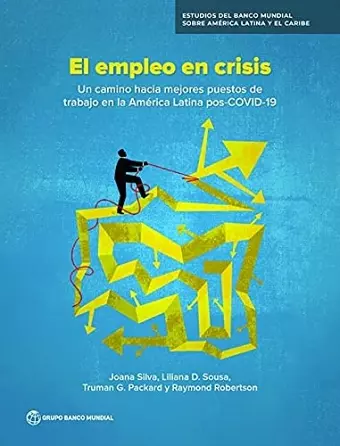Employment in Crisis (Spanish Edition)
The Path to Better Jobs in a Post-COVID-19 Latin America
Joana Silva author Liliana Sousa author Truman Packard author Raymond Robertson author
Format:Paperback
Publisher:World Bank Publications
Published:30th Jan '22
Should be back in stock very soon

A better policy framework for preventing, managing, and helping people recover from crises is crucial to lifting long-term growth and livelihoods in Latin America and the Caribbean (LAC). The need for this policy framework has never been more urgent as the region faces the monumental task of recovery from the worldwide COVID-19 pandemic. Whether specific policy responses will deliver the expected growth dividends will depend on the underlying vision of how labor markets adjust to crises and the quality of the policies enacted. This report estimates how crises change labor market flows, assesses how these changes affect people, and discusses the key policy responses.The key findings are threefold. First, crises have significant impacts on employment dynamics and structure in Latin America. Different labor market dynamics hide behind similar reductions in labor demand. Crises increase unemployment. This is the principal margin of adjustment despite highly informal labor markets. Across the region, the biggest employment losses are in the formal sector, driven by a reduction in job-finding rates rather than higher job-loss rates. Adjustment through reduction in hours worked does not seem to be an important factor in most countries' formal or informal sectors. Crises do not just shape worker flows temporarily—they have significant after-crisis effects on the structure of employment that last for several years. These effects are such that good job opportunities are gradually shrinking. Whereas in some countries the whole economy shrinks, in others informality serves as a partial buffer.Second, crises leave scars. Some workers recover from displacement and other livelihood shocks, while others are permanently scarred. For lower-skilled workers, earnings losses are persistent. Workers with higher education suffer no impacts of the crisis on their wages and very short-lived impacts on their employment. The responses are similar across male and female workers and workers with high and low previous participation in the formal labor market. New entrants to the labor market during a crisis face a worse career start – one from which it is difficult to recover. Yet, crises also bring efficiency gains, as detailed in this report.This study finds that both the structure of product markets and the conditions in local labor markets matter for the severity of crisis-induced employment and earnings losses across localities and sectors. Workers in more protected...
ISBN: 9781464816864
Dimensions: unknown
Weight: 473g
152 pages